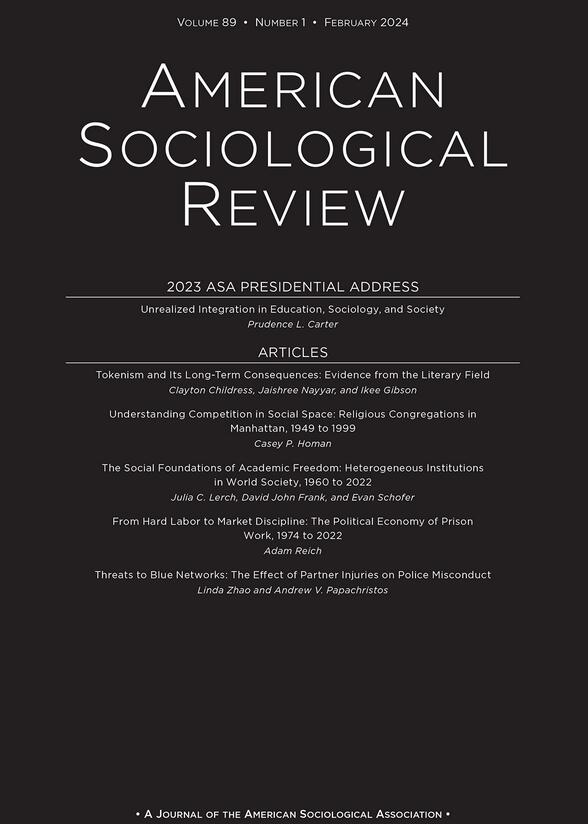Guns versus Climate: How Militarization Amplifies the Effect of Economic Growth on Carbon Emissions
IF 6.2
1区 社会学
Q1 SOCIOLOGY
引用次数: 3
Abstract
Building on cornerstone traditions in historical sociology, as well as work in environmental sociology and political-economic sociology, we theorize and investigate with moderation analysis how and why national militaries shape the effect of economic growth on carbon pollution. Militaries exert a substantial influence on the production and consumption patterns of economies, and the environmental demands required to support their evolving infrastructure. As far-reaching and distinct characteristics of contemporary militarization, we suggest that both the size and capital intensiveness of the world’s militaries enlarge the effect of economic growth on nations’ carbon emissions. In particular, we posit that each increases the extent to which the other amplifies the effect of economic growth on carbon pollution. To test our arguments, we estimate longitudinal models of emissions for 106 nations from 1990 to 2016. Across various model specifications, robustness checks, a range of sensitivity analyses, and counterfactual analysis, the findings consistently support our propositions. Beyond advancing the environment and economic growth literature in sociology, this study makes significant contributions to sociological research on climate change and the climate crisis, and it underscores the importance of considering the military in scholarship across the discipline.枪支与气候:军事化如何放大经济增长对碳排放的影响
基于历史社会学的基石传统,以及环境社会学和政治经济社会学的工作,我们通过适度分析,对国家军队如何以及为什么影响经济增长对碳污染的影响进行了理论化和调查。军事力量对经济体的生产和消费模式以及支持其不断发展的基础设施所需的环境需求产生了重大影响。作为当代军事化的深远而独特的特征,我们认为,世界军队的规模和资本密集度都会扩大经济增长对各国碳排放的影响。特别是,我们假设,每一个都会增加另一个放大经济增长对碳污染影响的程度。为了验证我们的论点,我们估计了1990年至2016年106个国家的纵向排放模型。在各种模型规范、稳健性检查、一系列敏感性分析和反事实分析中,研究结果始终支持我们的主张。除了推进社会学中的环境和经济增长文献外,这项研究还对气候变化和气候危机的社会学研究做出了重大贡献,并强调了在整个学科的学术中考虑军队的重要性。
本文章由计算机程序翻译,如有差异,请以英文原文为准。
求助全文
约1分钟内获得全文
求助全文
来源期刊

American Sociological Review
SOCIOLOGY-
CiteScore
13.30
自引率
3.30%
发文量
35
期刊介绍:
The American Sociological Association (ASA) is a non-profit membership association established in 1905. Its mission is to advance sociology as a scientific discipline and profession that serves the public good. ASA is comprised of approximately 12,000 members including faculty members, researchers, practitioners, and students in the field of sociology. Roughly 20% of the members work in government, business, or non-profit organizations.
One of ASA's primary endeavors is the publication and dissemination of important sociological research. To this end, they founded the American Sociological Review (ASR) in 1936. ASR is the flagship journal of the association and publishes original works that are of general interest and contribute to the advancement of sociology. The journal seeks to publish new theoretical developments, research results that enhance our understanding of fundamental social processes, and significant methodological innovations. ASR welcomes submissions from all areas of sociology, placing an emphasis on exceptional quality.
Aside from ASR, ASA also publishes 14 professional journals and magazines. Additionally, they organize an annual meeting that attracts over 6,000 participants. ASA's membership consists of scholars, professionals, and students dedicated to the study and application of sociology in various domains of society.
 求助内容:
求助内容: 应助结果提醒方式:
应助结果提醒方式:


